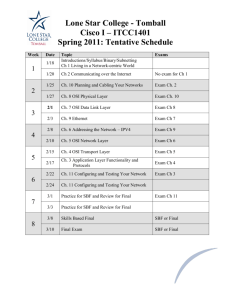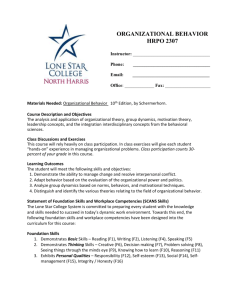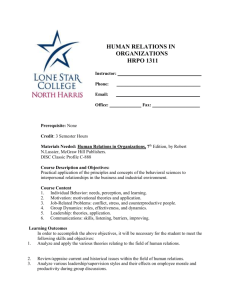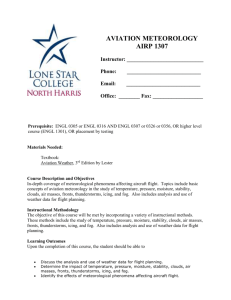Kingwood College - Lone Star College System
advertisement
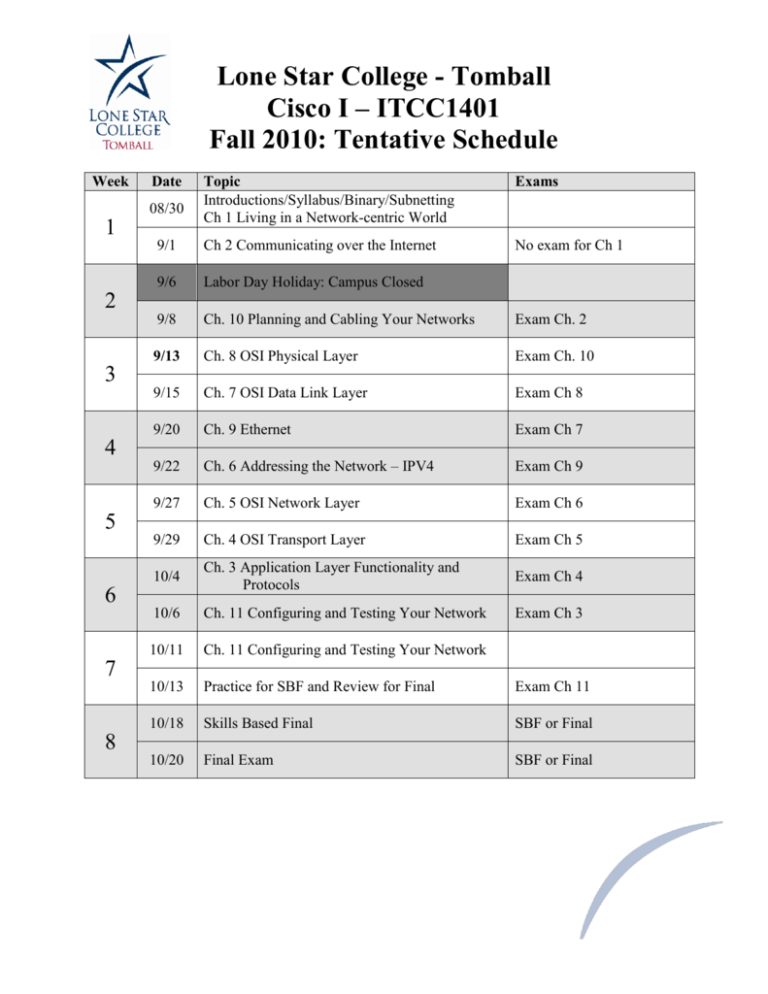
Lone Star College - Tomball Cisco I – ITCC1401 Fall 2010: Tentative Schedule Week Date Topic Introductions/Syllabus/Binary/Subnetting Ch 1 Living in a Network-centric World Exams 9/1 Ch 2 Communicating over the Internet No exam for Ch 1 9/6 Labor Day Holiday: Campus Closed 9/8 Ch. 10 Planning and Cabling Your Networks Exam Ch. 2 9/13 Ch. 8 OSI Physical Layer Exam Ch. 10 9/15 Ch. 7 OSI Data Link Layer Exam Ch 8 9/20 Ch. 9 Ethernet Exam Ch 7 9/22 Ch. 6 Addressing the Network – IPV4 Exam Ch 9 9/27 Ch. 5 OSI Network Layer Exam Ch 6 9/29 Ch. 4 OSI Transport Layer Exam Ch 5 10/4 Ch. 3 Application Layer Functionality and Protocols Exam Ch 4 10/6 Ch. 11 Configuring and Testing Your Network Exam Ch 3 10/11 Ch. 11 Configuring and Testing Your Network 10/13 Practice for SBF and Review for Final Exam Ch 11 10/18 Skills Based Final SBF or Final 10/20 Final Exam SBF or Final 08/30 1 2 3 4 5 6 7 8 Computer Information Technology CCNA1: Exploration - Network Fundamentals ITCC 1401 CATALOG DESCRIPTION: A course introducing the architecture, structure, functions, components, and models of the Internet. Describes the use of OSI and TCP layered models to examine the nature and roles of protocols and services at the application, network, data link, and physical layers. Covers the principles and structure of IP addressing and the fundamentals of Ethernet concepts, media, and operations. Build simple LAN topologies by applying basic principles of cabling; performing basic configurations of network devices, including routers and switches; and implementing IP addressing schemes. Course Title: CCNA 1: Exploration 1 – Network Fundamentals Course Number ITCC 1401 Credit/Contact Hours: 4 semester credit hours/80 contact hours 8 week class Prerequisites ITSC 1401 or Equivalent (Credit Students Only) Instructor Willie May Class/Lab Days and Times August 24 – October 14 Monday, Wednesday 8:00am – 1:00pm Class Room Location East 253 Office Hours: M W 1p – 5p or by appointment E-mail Willie.May@Lonestar.edu Phone: 281.401.1844 Division Contacts Dean: Dr. Cindy Casparis – 281.351.3339 Cynthia.A.Casparis@lonestar.edu Chair: Lindell Chapman – 281.357.3756 Lindell.Chapman@lonestar.edu Director: Willie May – 281.401.1844 Willie.May@lonestar.edu LEARNING OUTCOMES: Identify and describe internet architecture, structure, functions, components, and models. Describes the use of OSI and TCP layered models Identify and describe the nature and roles of protocols and services at the application, network, data link, and physical layers. Describe principles and structure of IP addressing and the fundamentals of Ethernet concepts, media, and operations. Build simple LAN topologies by applying basic principles of cabling, device configuration, and IP subnetting REQUIRED MATERIALS: 1 package of laser printer paper (prefer 3-hole punched) Optional Materials Network Fundamentals, CCNA Exploration Companion Guide, ISBN: 1587132087 / ISBN 13: 9781587132087 CCNA Official Exam Certification Library (CCNA Exam 640-802), 3rd Edition, ISBN-10: 1-58720-183-6; ISBN-13: 978-1-58720-183-7; Published: Sep 7, 2007 CCENT/CCNA ICND1 Official Exam Certification Guide (CCENT Exam 640-822), 2nd Edition, ISBN-10: 1-58720182-8; ISBN-13: 978-1-58720-182-0; Published: Aug 30, 2007 CCNA ICND2 Official Exam Certification Guide (CCNA Exam 640-816), 2nd Edition, ISBN-10: 1-58720-181-X; ISBN-13: 978-1-58720-181-3; Published: Aug 31, 2007 LETTER GRADE ASSIGNMENT: Final letter grades will be assigned after computing individual final averages in percent as follows: Final Average in Percent 90 - 100 80 - 89 70 – 79 60 – 69 Below 60 Letter Grade A B C D F Grades will be determined as follows: Labs & Assignments Chapter Exams Case Study Skills Based Final Final Exam Total 20% 20% 10% 25% 25% 100% ATTENDANCE AND PARTICIPATION POLICY: The maximum number of absences allowed before a reduction in the final grade average is 4. After the Fourth absence, 5 points will be deducted from the final grade average for each additional absence. A student will be considered absent if he is not present when the roll is called BOTH at the beginning of class (even if he should show up later) and at the time of dismissal of class. The student should realize that an excessive number of absences will prohibit the completion of course objectives. If a student should miss a class lecture, it is the student’s responsibility to contact another student to obtain the lecture notes and any assignments. Students are expected to assume the responsibility for learning. Your instructor will assist you, but the actual responsibility rests with you. Students are expected to devote their energy to attaining the skills and knowledge required for their particular career goals. The Lone Star College Tomball Policy and Procedure Manual [Student Conduct Section 562.01d] states, “Disruptive activity that hinders other students’ learning or deters an instructor from effective teaching will not be tolerated under any circumstances.” To provide an equal-opportunity learning situation for all students enrolled in this class, children are not allowed in the labs or classrooms. ASSIGNMENTS: All assignments are to be completed and submitted to the instructor on the scheduled due date. No late assignments will be accepted. You must demonstrate mastery of all Basic Skills for each section of the lab to earn credit for the course. Your instructors will supply detailed testing and grading procedures. Homework assignments will be made by the instructor. They may consist of exercises in the textbook or lab exercises. Five points will be deducted from the homework grade for each class day the homework is turned in late. Homework is due at the start of class on the day it is due. Homework may be turned in early but must be turned in at the start of the class when it is due. MAKE-UP EXAMS: Students should contact the instructor prior to missing a scheduled examination by phone, in-person, by email, or by voice mail. An opportunity to take an alternative examination will be offered to those who make prior contact with the instructor. All make-up exams will be administered during normal class time. WITHDRAWAL POLICY: Withdrawal from the course after the official day of record and prior to “W” day (see current catalog) will result in a final grade of “W” on the student transcript and no credit will be awarded. . If you stop attending class, you must withdraw at the Registrars office before the official drop date. Failure to do so will result in an “F” for the course. Should a student decide to drop this course, it is the student’s responsibility to officially withdraw from the course. ACADEMIC INTEGRITY: The Lone Star College is committed to a high standard of academic integrity in the academic community. In becoming a part of the academic community, students are responsible for honesty and independent effort. Failure to uphold these standards includes, but is not limited to, the following: plagiarizing written work or projects, cheating on exams or assignments, collusion on an exam or project, and misrepresentation of credentials or prerequisites when registering for a course. Cheating includes looking at or copying from another student's exam, orally communicating or receiving answers during an exam, having another person take an exam or complete a project or assignment, using unauthorized notes, texts, or other materials for an exam, and obtaining or distributing an unauthorized copy of an exam or any part of an exam. Plagiarism means passing off as his/her own the ideas or writings of another (that is, without giving proper credit by documenting sources). Plagiarism includes submitting a paper, report or project that someone else has prepared, in whole or in part. Collusion is inappropriately collaborating on assignments designed to be completed independently. These definitions are not exhaustive. When there is clear evidence of cheating, plagiarism, collusion or misrepresentation, a faculty member will take disciplinary action including but not limited to: requiring the student to retake or resubmit an exam or assignment, assigning a grade of zero or "F" for an exam or assignment; or assigning a grade of "F" for the course. Additional sanctions including being withdrawn from the course, program or expelled from school may be imposed on a student who violates the standards of academic integrity. SOFTWARE PIRACY: Law strictly prohibits unauthorized copying of software purchased by Lone Star College - Tomball for use in laboratories. Lone Star College - Tomball administration will take appropriate disciplinary action against anyone violating copyright laws. COMPUTER VIRUS PROTECTION: Computer viruses are, unfortunately, a fact of life. Using the diskettes on more than one computer creates the possibility of infecting computers and diskettes with a computer virus. This exposes the computers of the college, your personal computer, and any others you may be using to potentially damaging viruses. The college has aggressive anti-virus procedures in place to protect its computers, but cannot guarantee that a virus might not temporarily infect one of its machines. It is your responsibility to protect all computers under your control and use and ensure that each electronic removable device you use, whenever or wherever you use it, has been scanned with anti-virus software. Since new viruses arise continually, your anti-virus software must be kept current. And, since no anti-virus software will find every virus, keeping copies of data (backups) is extremely important. EQUAL OPPORTUNITY STATEMENT: It is the policy of the Lone Star College System to provide equal employment, admission and educational opportunities without regard to race, color, religion, national origin, sex, age, or disability. Lone Star Colleges strive to provide an excellent learning environment free from harassment or intimidation directed at any person’s race, color, religion, national origin, sex, age, or disability. Any form of harassment will not be tolerated ADA STATEMENT: The Lone Star Colleges are dedicated to providing the least restrictive learning environment for all students. The college district promotes equity in academic access through the implementation of reasonable accommodations as required by the Vocational Rehabilitation Act of 1973, Title V, Section 504 and the Americans with Disabilities Act of 1990 (ADA) which will enable students with disabilities to participate in and benefit from all post-secondary educational activities. If you require reasonable accommodations because of a physical, mental, or learning disability, please notify the instructor of this course as soon as possible and preferably before the end of the first two weeks of class to arrange for reasonable accommodations. GUARANTEED GRADUATE POLICY: The Lone Star College System guarantees that graduates of its Associate of Arts, Associate of Science, or Associate of Applied Science and all Certificate programs, providing under certain circumstances, additional education and training tuition free to students lacking appropriate mastery of specified competencies. For additional information, refer to the Lone Star College catalog. INTERNET AND E-MAIL: The District provides computing and network resources to students. Students are encouraged to use the computers, software packages, and electronic mail (e-mail) for educational or District-related activities and to facilitate the efficient exchange of useful information. However, the equipment, software, and network capacities provided through the district computer services are and remain the property of the District. Use of the equipment and networks is to comply with the policies and procedures of the District and access may be denied to any student who fails to comply with the District’s policies and procedures regarding its use. Access to the District’s e-mail and similar electronic communications systems are a privilege and certain responsibilities accompany that privilege. District users are expected to demonstrate the same level of ethical and professional manner, as is required in face-to-face or written communications. Anonymous or forged messages will be treated as a violation of this policy. Statement of Workplace and Foundation Competencies (SCANS Skills) The Lone Star COLLEGE is committed to prepare you with the knowledge and skills you need to succeed in today’s dynamic work environment. Towards this end, the following workplace competencies and foundation skills have been designed into the curriculum for this course: SCANS The Secretary’s Commission on Achieving Necessary Skills (SCANS) has researched and listed the skills and competencies that employees will need for workplace success. The SCANS skills that are found in the course learning outcomes are: 1. Resource Allocation Students who commit themselves to take this course display a level of skill at allocating time and money in the pursuit of a goal. They learn to take advantage of available resources, human (instructor, librarians) as well as material (laboratory hardware, network applications, publications, Internet). This is further enhanced during the semester, as students must apply their knowledge to life-like laboratory experiments, study for tests, and prepare for technical exams. 2. Information Collection and Gathering Class attendance, note taking and research develop the students' ability to collect data and extract information. The skill developed is necessary for understanding the course material and working on laboratory assignments. 3. Interpersonal Communication The instructor routinely quizzes students both during lecture and in the form of take home essay exams, to develop verbal and written communication skills. They are also encouraged to work in groups, participate in class discussion, and share their knowledge of system software. 4. System Understanding This course is highly technical and teaches students the concepts of personal computer operating system installation and management. 5. Technology Understanding This course teaches students technology concepts, which include the nature of personal computer operating systems, control of PC systems through commands, file handling, back-up/restore features, system tuning and utilities. 6. Basic Skills A course of this level requires listening and speaking, reading and writing skills, and comprehension, for traditional or Internet class attendance as well as for the research and conduct of laboratory assignments. A solid background in mathematics gives the students the analytical and logical training required for troubleshooting such a complex environment as a personal computer operating system with both graphical and command line utilities. 7. Thinking Skills Class discussions, tests, and assignments are designed to enhance students' thinking skills rather than emphasize rote memorization. 8. Personal Qualities Responsibility, self-esteem, sociability, self-management, integrity and honesty are emphasized and developed in the course of the semester as students learn to apply the skills they are practicing in the classroom, on the Web and in laboratory experiments.. Lone Star College - Tomball Cisco I – ITCC1401 Fall 2010: Tentative Schedule Week Date Topic Introductions/Syllabus/Binary/Subnetting Ch 1 Living in a Network-centric World Exams 9/1 Ch 2 Communicating over the Internet No exam for Ch 1 9/6 Labor Day Holiday: Campus Closed 9/8 Ch. 10 Planning and Cabling Your Networks Exam Ch. 2 9/13 Ch. 8 OSI Physical Layer Exam Ch. 10 9/15 Ch. 7 OSI Data Link Layer Exam Ch 8 9/20 Ch. 9 Ethernet Exam Ch 7 9/22 Ch. 6 Addressing the Network – IPV4 Exam Ch 9 9/27 Ch. 5 OSI Network Layer Exam Ch 6 9/29 Ch. 4 OSI Transport Layer Exam Ch 5 10/4 Ch. 3 Application Layer Functionality and Protocols Exam Ch 4 10/6 Ch. 11 Configuring and Testing Your Network Exam Ch 3 10/11 Ch. 11 Configuring and Testing Your Network 10/13 Practice for SBF and Review for Final Exam Ch 11 10/18 Skills Based Final SBF or Final 10/20 Final Exam SBF or Final 08/30 1 2 3 4 5 6 7 8 STUDENT CONTRACT NETWORK FUNDAMENTALS CISCO 1 ITCC 1401 I (print your name in the following space) _________________________________________________ have read and understand the following course requirements. 1. I will be allowed to miss class 4 times before any points will be deducted from my final grade. I understand that 5 points will be deducted from my final grade average for each absence over four. 2. I understand that if I arrive in class after the roll has been called or if I leave before class is dismissed, that I will be counted absent for that class. 3. I understand that there is NO EXEMPTION from the CISCO Final Exam and the Skills Based Final Exam. 4. I understand how my grade will be determined. 5. I understand that homework is due at the start of the class period on the day it is due. Homework turned in at the end of that class will be considered late. Late homework will have 5 points deducted for each class period it is late. Five points bonus will be added to homework turned in on time, which is printed on the computer (up to a maximum of 100 points). 6. I understand that if I have to miss a class, I can turn homework in early, either in a prior class or by leaving it in the Instructor’s mailbox at the college. It is my responsibility to contact other students for any class notes or handouts I may have missed during the absence. 7. If I must miss a test, I can contact the instructor before hand or immediately upon my return to make arrangements for a makeup test. Failure to do so within one week of the test will void my right to a make-up test. 8. I understand that it is my responsibility to officially withdraw if I decide to drop this course. If I decide to drop, and do not officially withdraw by the deadline, the grade of “F” will be assigned. _________________________________________ Signed _______________________ Date Lone Star College - Tomball ITCC 1401 – STUDENT PROFILE I have viewed the syllabus for this course. Yes ______ No ______ Name: Address: City & Zip: Day Evening Phone: Cell Phone/Other Tell me about your semester: 1. A. How many hours are you taking? B. What other courses are you taking (if any)? C. Are you working? If so, how many hours? Where & doing what? How many hours have you completed in college? 2. A. What certificate or degree are you working towards? B. Would you like information on the degrees and certificates offered in Computer information Systems? Do you have any special needs that you wish your instructor to know about? 3. Why are you taking this class? Check all that apply. 4. 5. 6. Personal knowledge Required course Building skills for present job Building skills for future job We will develop a list for student reference of our class phone numbers. If you wish to participate, please write the number you want fellow students to use to contact you. Phone: If you have an Internet e-mail address you check frequently, please indicate the address. (If you are interested in obtaining a free email address through the college, ask your instructor for directions or visit http://www.lonestar.edu and follows applying for email instructions.) E-mail address: Please provide a name and address of a person or persons that can be contacted in event you can not be located with the information you have provided with this document. Name Address 7. Alternative Contact ________________________________________________________ ______________________________________________________ ______________________________________________________ City/St/Zip _____________________________________________________ Phone # _______________________________________________________ Relation _______________________________________________________
